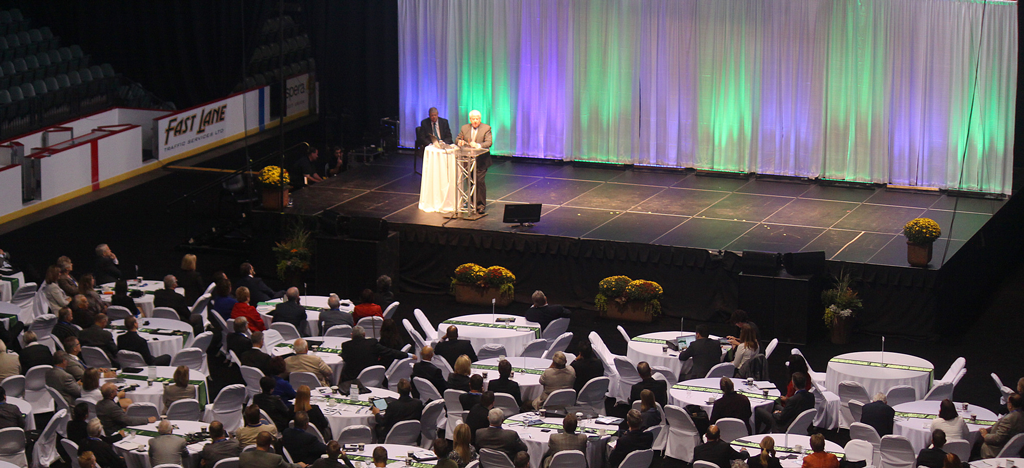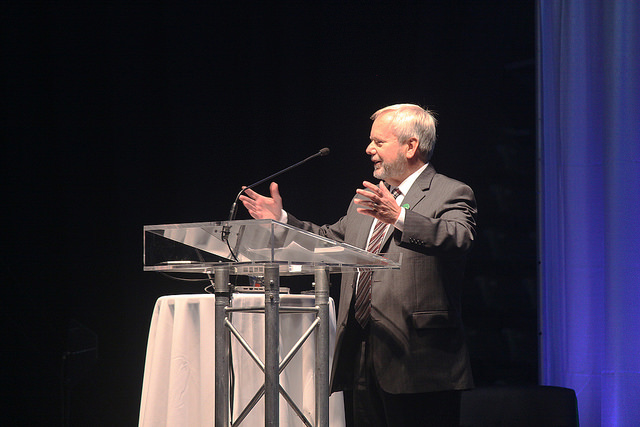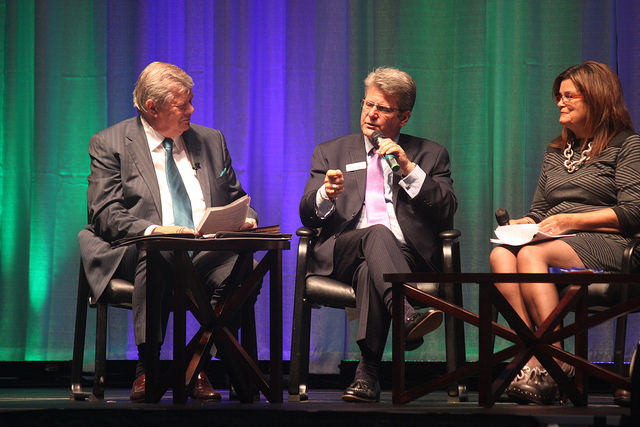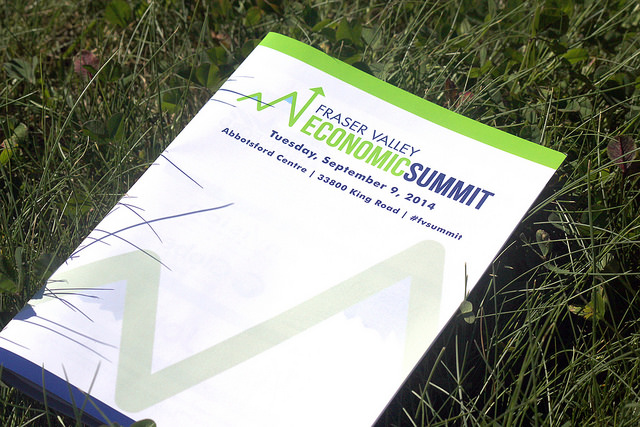Print Edition: September 17, 2014
“Now’s the time to set up shop in the Fraser Valley,” said Justin Goodrich, chair of the organizing committee for the Fraser Valley Economic Summit on September 9.
Small business owners and leaders gathered for the one-day event at the Abbotsford Centre to look forward to future development in the region.
It is the second time such an event has been held — the first, a symposium was launched in 2012.
It was intended to be an annual event, but a transition in the city’s economic development office prevented it from taking place last year, it was re-envisioned with a broader scope.
Goodrich is also UFV’s alumni associations chairman, as well as the managing partner at Giesbrecht, Goodrich & Co., a firm specializing in advocacy and government relations.
According to Goodrich, this summit is important for businesses in the Fraser Valley because other events don’t address their needs or interests.
“Normally these kinds of summits happen essentially west of Langley,” he said. “Surrey sort of does its own thing, and then of course you head into Vancouver. And the information in those cities isn’t relevant to the Fraser Valley.”
The scope of the summit was based on a vision of regional collaboration, with the understanding that the economies of the different municipalities within the Fraser Valley are intertwined with one another.
The summit began with a 7:30 a.m. networking breakfast and business showcase, where businesses had an opportunity to connect with each other, and then officially opened with a motivational speaker. That was followed by a string of keynote speakers, breakout sessions, a mayor’s panel, and a closing keynote speech and Q&A with former CKNW radio show host Bill Good.
The city-directed outcome of the summit was “to make sure that whoever attended the summit left with good, tangible information that they could take and apply to their business. And to make sure it was Fraser Valley-focused,” Goodrich explained.
“It demonstrated Abbotsford’s commitment to the small business community, which is really the lifeblood of our local economy.”
Goodrich also noted UFV’s prominence at the event as a source of economic growth in the region.
“They’re a huge economic driver; we’re not just talking about job creation, but we’re talking about job innovation as well,” he said.
In addition to the university’s sponsorship, UFV president Mark Evered was a featured speaker. Executive director of facilities and campus planning Craig Toews also spoke at one of the three breakout sessions, and Leslie Courchesne, executive director of marketing and communications, introduced Bill Good.
Goodrich lauded Evered for his contributions.
“How do we create and build a creative economy, and how do we engage future business leaders and thinkers? I just think he challenged us, and did an excellent job challenging us,” he said.
According to Goodrich, the Fraser Valley’s economy is only going to grow as people continue to start businesses and families here.
“We’re going to see huge growth numbers in terms of population in the next 20 years,” he said, “which means we’re going to see a huge growth in economic activity.”
MP Ed Fast suggests Canada needs to take advantage of available resources
Minister of International Trade Ed Fast mainly discussed topics from his portfolio. Giving practical advice on tools businesses can access and underutilized services, he said his motivation was to empower businesses to expand beyond their base locations. Fast also pointed out the reasons Canadian businesses have so much potential to be prosperous in other markets, and why Canada is such a strong location for business.
However, according to Fast, Canada still leaves money on the table by not using all the tools available. He also offered an explanation for the federal government’s aggressive approach to trade agreements.
“One in five Canadian jobs is directly dependent on foreign trade,” he said, adding that “60 per cent of GDP is directly or indirectly related to trade.”
Kinder Morgan president stresses benefits of pipeline expansion project
Ian Anderson, the man at the helm of Kinder Morgan, primarily spoke about the benefits and opportunities their current expansion project presents to the various municipalities it will traverse, as well as the challenges in keeping both national and local interests balanced.
“I think it’s one of the profoundly important challenges we face as a country,” he said.
Anderson also described how conversations vary in each region his company’s pipeline travels through.
“As you go down along the line, the conversations are different. The conversations about the impact, the conversations about the effect, the conversations about the opportunities are all different.”
He also said the Fraser Valley is a place which has struck a balance between environmental concerns, like the safety and preservation of watershed and agricultural land, and the pursuit of economic opportunities.
“This is the place that I find those things in most balance,” he said.
According to Anderson, some of the benefits that will directly affect regional municipalities will come in the form of significant contributions to property taxes.
“We’ll have $500 million invested into the local communities through which we traverse,” he stated. “We will increase $23 million every year in property tax payments. Hope will go from $700 to $1.3 million, Abbotsford will go from $2.1 million to $3.4 million every year, Chilliwack will go from $700 to $1.6 million.
“Over the 20-year life of the project, we will increase our property tax payments to British Columbia communities by just short of half a billion dollars.”
UFV president Mark Evered says creativity is key
Evered emphasized that the growth of the creative sector, such as the tech industry, is fast outpacing many others.
“Getting more creative in all sectors of the economy, from mining and manufacturing to healthcare and tourism, will increase Canada’s competiveness and prosperity,” he said, citing points from a report by Hirsch and Roach.
“There is not a single sector of the economy that would not benefit from clever solutions to problems, new way of seeing things, and unique products.”
Evered pointed out that as the workforce has decreased in manufacturing over the last 60 years, it has increased in the creative class.
“Technology is affecting transport, but of course it’s affecting communication … It’s not just the communication, but many have argued that through this technology we’re entering a new industrial revolution — a revolution that is moving the worker from the manufacturing plant to our small businesses, and even to the desktop.”
He described the current consumer as an “on-demand, mobile consumer … And a consumer who is also demanding [customization] in the services and products we provide.”
Evered posed the question of how to build and support the creative economy in the Fraser Valley.
“It’s hard work because creative and ambitious professionals are among the most mobile on the planet,“ he stated.
He also noted the importance of instilling creativity in every aspect of education and business.
Evered explained there must to be a technical infrastructure in place, but also opportunities to connect with other creative individuals and community.
Real estate expert weighs in on demographic shifts
Director of Research for Real Estate Investors Network Melanie Reuter spoke on demographic change. As pointed out by professional services network PricewaterhouseCoopers, there are five current megatrends.
“In the next 25 years, 70 to 75 per cent of the world’s population will live urbanely. That’s 1.5 billion people moving from rural areas to urban areas,” she said. “This is going to put incredible stress on infrastructure.”
She noted that with a population of 8.3 billion people by 2030, the world will need 50 per cent more energy, 40 per cent more water, and 35 per cent more food.
“[This] is really great news for Canada, for BC and the Fraser Valley,” she said, “because what we really have going for us as a country is the four Fs: food, fuel, fertilizer, and forestry.”
Reuter also commented on the changing age of the workforce.
“Generation Y’s impact on real estate and the economy in general will be as striking and as long-lasting as that of baby boomers,” she said.
She suggested changes that would attract a younger workforce.
“Consider creating jobs in the areas where people are moving,” she said. “Think of where millennials are going to want to be, and go to those areas … what can we do to create an environment where they don’t have to move to Vancouver?
“The old way of doing things is not the only way.”
Panel provides space for mayors to field questions
In this panel moderated by Bill Good, five local mayors sat along the stage to respond to questions. Each mayor gave his or her response as the mic was passed down the line. The first question was: “Is there a role for local governments in stimulating job growth by working with the local business community to create new jobs?”
The answer was unanimously positive. Abbotsford mayor Bruce Banman answered first, noting the summit itself was a good example.
“What cities do best, I think, is to provide an atmosphere that’s welcoming to businesses and more importantly helps to foster those businesses,” he concluded.
Jack Froese, mayor of the Township of Langley, emphasized creating livable communities so people and businesses want to move there, and also the importance of an inter-municipal business license.
“We’ve partnered with neighbouring municipalities to allow certain businesses to get one business license that would allow them to work throughout the region,” he said.
The final question stirred a little friendly interregional rivalry.
“If you had just one minute to pitch your community to a potential business owner on the merits of why they should choose your community, what would you say?” asked Good.
Banman began once more.
“Abbotsford historically has been the hub, and it’s all about location, location, location.” He said the city’s greatest strength is that it is the third most culturally diverse city in British Columbia.
Froese disagreed.
“I know Mayor Banman said that Abbotsford is the hub of the Fraser Valley, [but] I think Township of Langley is the hub of the region,” he said.
The mayors of Mission, Chilliwack, and the City of Langley also participated in the panel.
Bill Good closes with a little contemporary commentary
The summit was capped with Bill Good as the final speaker.
“Well, this will be short, as I have nothing left to say,” Good joked as he stepped to the mic.
Having recently left his longstanding show on CKNW 980, Good spoke mostly about the media industry.
He contrasted the media from the start of his career to today, focusing on sports broadcasting as an example.
“That’s all taken place in a short period of time,” he said. “But it’s indicative of how the media markets have exploded around the world.”
Keeping his speech on the shorter side, Good saved time for questions and answers.
One question in particular was on the future of radio. Good expressed his uncertainty, but suggested the medium will change and adapt. He did expand on the subject to discuss a certain media business model.
“Part of the problem was for too long they were giving their product away,” he said. “I never understood why the Vancouver Sun, or anybody else, was putting product out there and giving it away. I mean, you can’t pay your reporters, you can’t pay your salespeople, you can’t pay your columnists if you’re not getting a return.”
Good also commented on the BCTF strike; he didn’t have an answer on how it will end, but suggested the government “is enjoying seeing the BCTF being made so uncomfortable. I think the teachers are finding out what it’s really like to go on strike.”
Good also took a question on the cuts to CBC’s funding.
“The government of the day, and whatever [the] government of the day happens to be, finds the CBC a bit annoying and they tend to target it,” he said. “And I think this government came into power with a real strong dislike for the CBC. That said …there is less and less a need for a full-on commercialized television broadcaster in this country.”






